Pay, scheduling causes widespread SMART, DDOT driver shortage, missed routes
In her 30 years as a bus driver, Miquita Burton sees 2023 as a milestone but not necessarily a positive one.
Metro Detroit is facing a bus driver shortage and that means there aren’t always enough drivers available, leading to cancellations or delays that inconvenience riders and put extra strain on the drivers who are available.
The two main bus systems serving Detroit and its suburbs, the Detroit Department of Transportation and the Suburban Mobility Authority for Regional Transportation, are short upwards of 200 drivers right now. SMART currently has 288 drivers working; DDOT has 388.
“I think it’s the worst I’ve ever seen,” said Burton, a driver for SMART and vice president of Amalgamated Transit Union Local 1564.
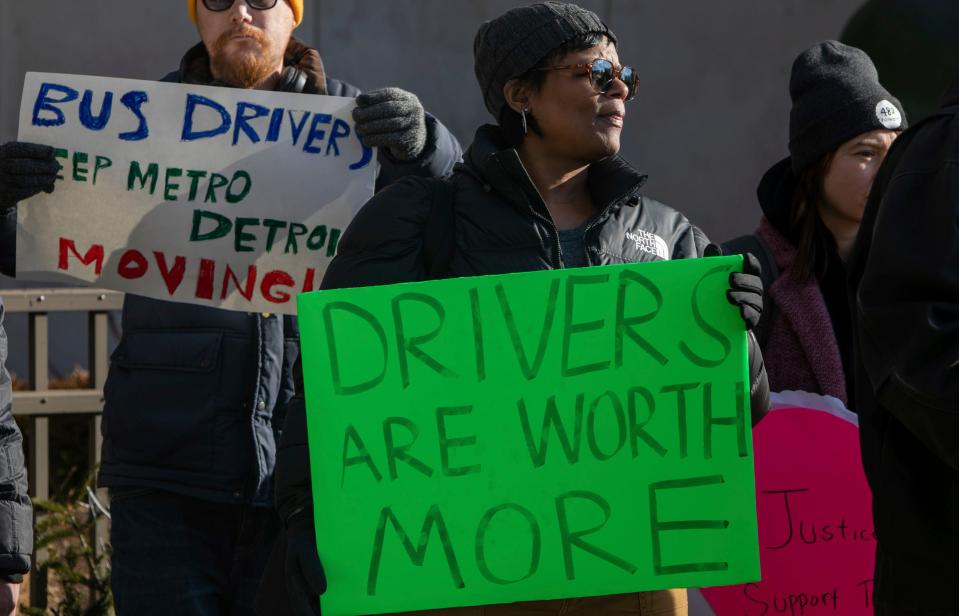
The shortage is an issue for metro Detroit, but one felt nationwide, too. Experts point to a range of factors, from inadequate compensation in a tight job market and retirements to concerns about safety and work-life balance, which have been exacerbated by the pandemic.
C. Mikel Oglesby, executive director of transit for the city of Detroit, speaking at a transit event in Detroit in January said, “This is not just a problem in Michigan, this is a problem in the United States.”
The American Public Transportation Association reported in October that 96% of agencies it surveyed were dealing with a workforce shortage, including bus drivers and mechanics, and 84% of those agencies said it was hampering their ability to provide service.
Metro Detroit, however, has been hit particularly hard, with SMART operating at about 75% of its service level before the pandemic, according to Tiffany Gunter, SMART’s deputy general manager and chief operating officer. For DDOT, the number was 68%, according to information provided by the advocacy group Transportation Riders United.
More:Express shuttle between downtown Detroit, Metro Airport could launch by end of 2023
Oglesby acknowledged “major challenges” for DDOT in his recent talk but noted that “if you don’t have enough people for the schedule then you just change the schedule for the people that you have.” He said DDOT was providing comparable "revenue miles" to last year and predicted that when enough drivers are able to be hired that service would improve dramatically.
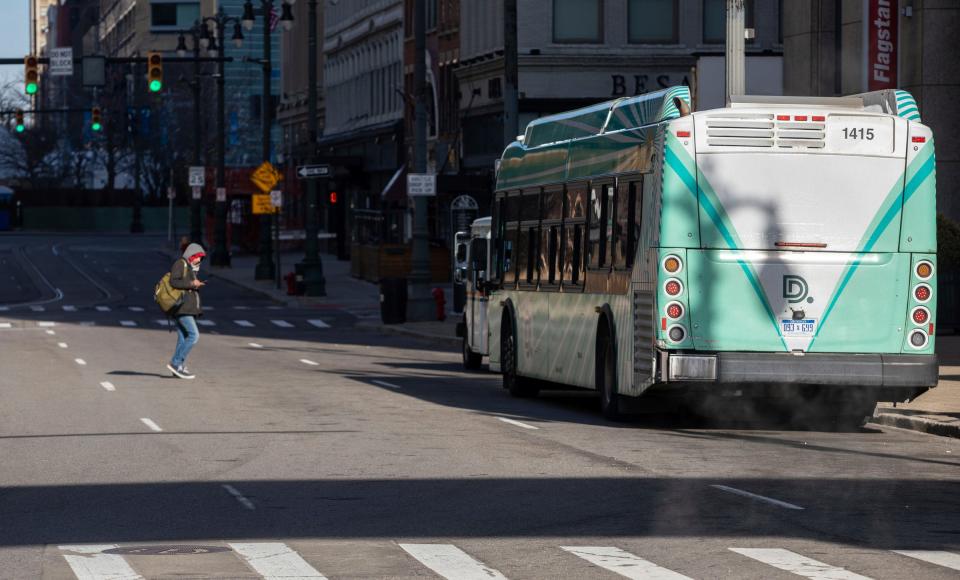
Service issues are evident now, however, and the impact of the driver shortage is clear to Mitch Mantey, 28, of Detroit. Mantey told a Free Press reporter Feb. 14 during a pro-bus-driver rally in Detroit to raise awareness of the issue that to even get to the event he had to ride a bike downtown from Eight Mile and Livernois after four different DDOT and SMART buses he expected to be able to take were canceled.
Gunter said that being 80 to 100 drivers short for SMART’s fixed routes has a direct effect on the system’s service levels.
“What that impact has been is that there are many days runs are missed and people are not able to get the ride they expect from us,” she said.
Pay takes a toll
Drivers like Burton, who operates SMART’s Woodward Local Route 460, and transit advocates point to low pay as a key reason it’s tough to recruit and retain drivers, and they want both bus systems to boost starting compensation. SMART, which is currently in talks with its drivers for a new contract, has a starting pay of $16.50 per hour during eight weeks of training and $19.11 per hour after; DDOT is lower, at $14.71 per hour during 12 weeks of training and $16.81 following probation, according to information from the city. Both offer health, retirement and other benefits, as well.
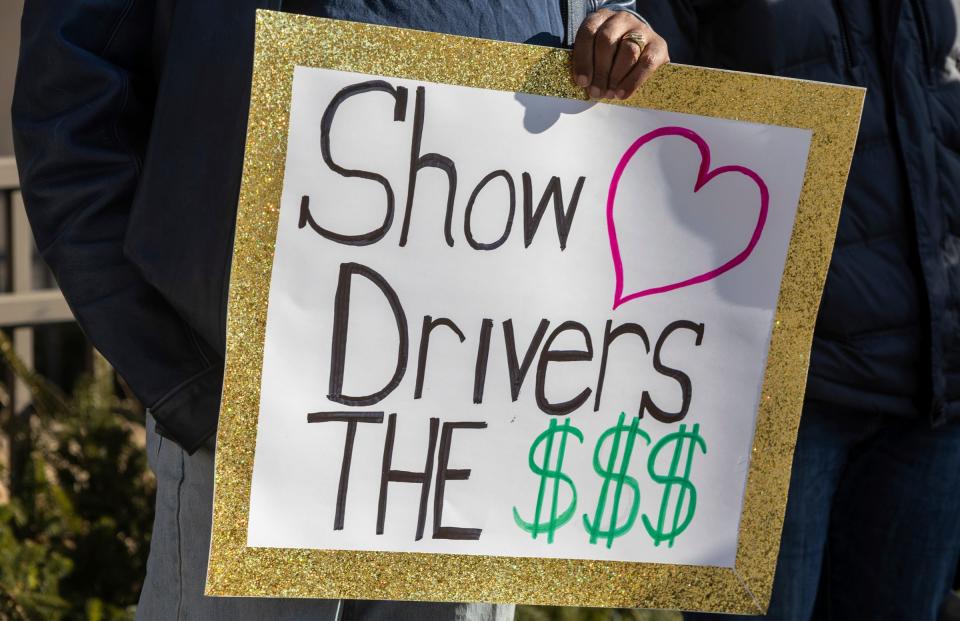
Those starting salaries are at or near the bottom on a list of a dozen transit agencies nationwide, including those in Chicago, Cleveland, New York and Memphis, Tennessee, that Transportation Riders United highlighted in an email to the Free Press. The Ann Arbor Area Transportation Authority, known as TheRide, was also on the list with a starting salary for drivers of $28.65 per hour.
More:Funding better bus service in Detroit would mean access to thousands of jobs, group says
DDOT’s union contract expires in 2025, but transit advocates say that should not prevent the city from boosting pay now. The city is, after all, in competition for staff not just with larger metro areas farther away, they say, but also locations that are much closer, such as Ann Arbor.
Samantha Potter, a spokeswoman for TheRide, said the agency is continuing to recruit drivers and anticipates hiring more of them through 2024.
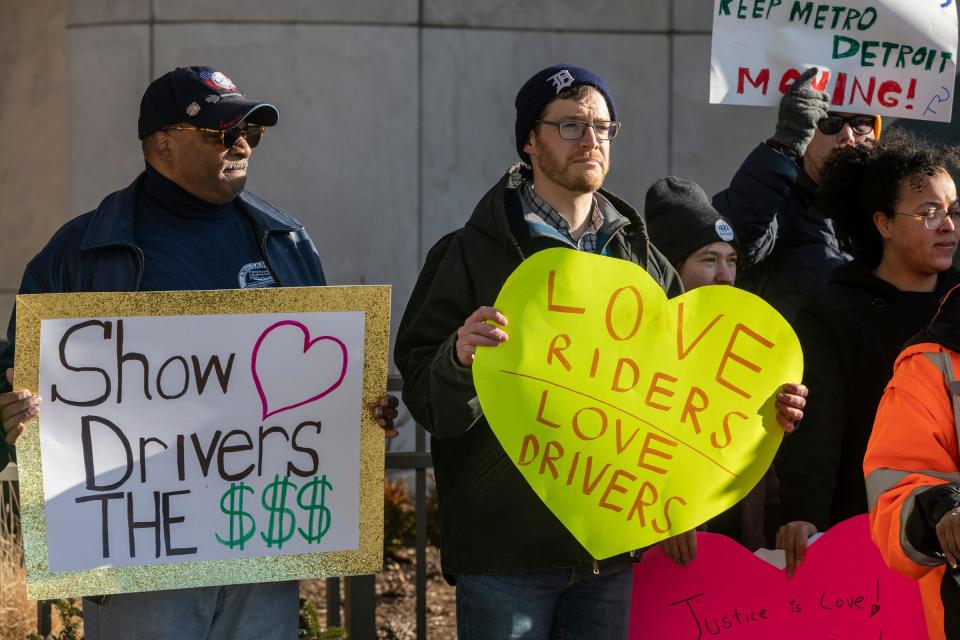
Schetrone Collier, president of DDOT’s drivers’ union, ATU Local 26, said Detroit’s system, which counted 388 active drivers as of Feb. 16, with 28 scheduled to start on Feb. 20, cannot retain people at the wages that are being paid.
And Burton, who said she makes $23.88 per hour, said drivers need to make enough money to be able to support their families at a time when the cost of living has been increasing.
“We deserve a living wage because we’re essential,” she said.
'Show drivers love'
That role as essential service providers facing unique challenges was on display during the pandemic, which upended ridership assumptions, undercut farebox revenues and added new worries to the job.
On Feb. 14, close to two dozen advocates and drivers, including Burton and Collier, rallied outside the Coleman A. Young Municipal Center in Detroit to raise awareness of the plight of drivers and push for better pay and benefits. They held bright green, pink and yellow signs, many in heart shapes for Valentine’s Day, with messages saying “Love Riders, Love Drivers,” “Bus Drivers Are Worth More” and “Show Drivers Love.”
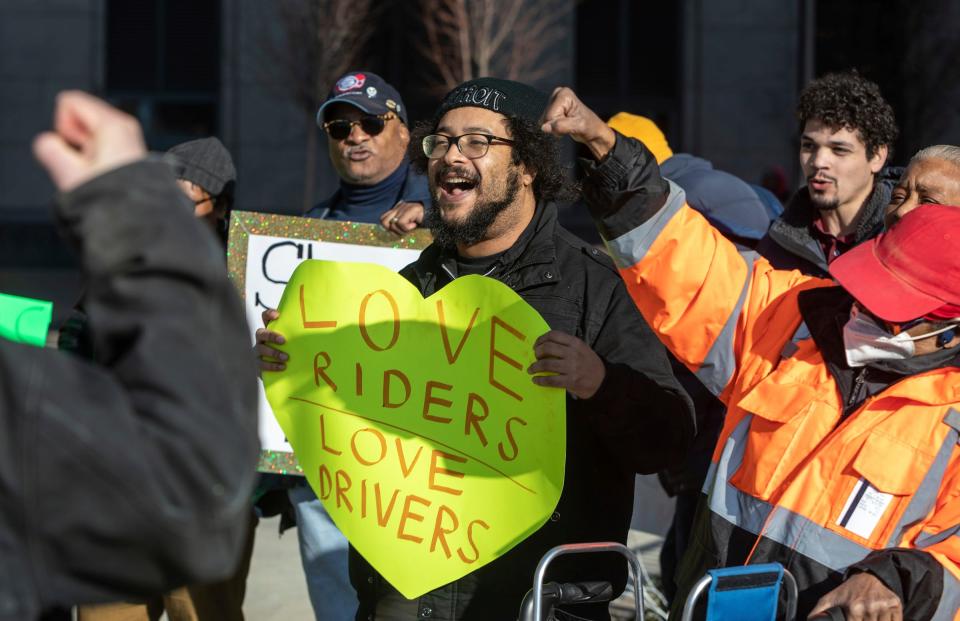
They called on the city to invest in DDOT and treat it like a priority. They called on SMART to do better for its drivers, especially in light of the approval by Oakland County voters in November of a 10-year countywide millage to support transit that will support SMART operations in the county. The millage is expected to raise an estimated $66 million in its first year.
Gunter said SMART, which has 288 active fixed route drivers as of this past week, is working to be as competitive as possible on wages and as flexible as possible on issues like scheduling, noting that work-life balance matters to people.
More:Detroit Mayor Mike Duggan puts emergency contract in place to fund paratransit services
“That is all on the table now,” she said, noting that SMART’s goal is to be an attractive employer for anyone seeking to be a driver. With contract talks underway — Gunter said they started in earnest in November — details on the current proposals weren’t released.
Kevin Colon, president of ATU Local 1564, said the union would like a three-year contract and a percentage increase in wages, although he declined to be specific because of the negotiations.
"We want a fair wage increase," he said, noting that bus drivers have sacrificed over the last three years and couldn't work remotely during the pandemic like some other workers.
"You can't drive a bus from home," he said.
Gunter said SMART is aggressively recruiting in an effort to address the shortage, pointing to two job fairs this month, and said more are planned for March and April. The organization also wants to hire a recruiter.
What it takes to drive the bus
Some of the minimum requirements SMART expects of its drivers include the ability to obtain a commercial driver’s license, having fewer than four points on a driving record in the last five years and having no suspensions revocations or restrictions in the prior three years. Candidates also need a high school diploma or GED and a minimum of five years licensed driving experience.
Although federal requirements on drug testing are cited as one factor in the shortage, Gunter said that’s not really the issue locally. Turnover, including from retirements, and the challenge of trying to accommodate qualified candidates who have child care needs are bigger factors, she said.
Nationally, the challenges of attracting candidates to work in the field are many.
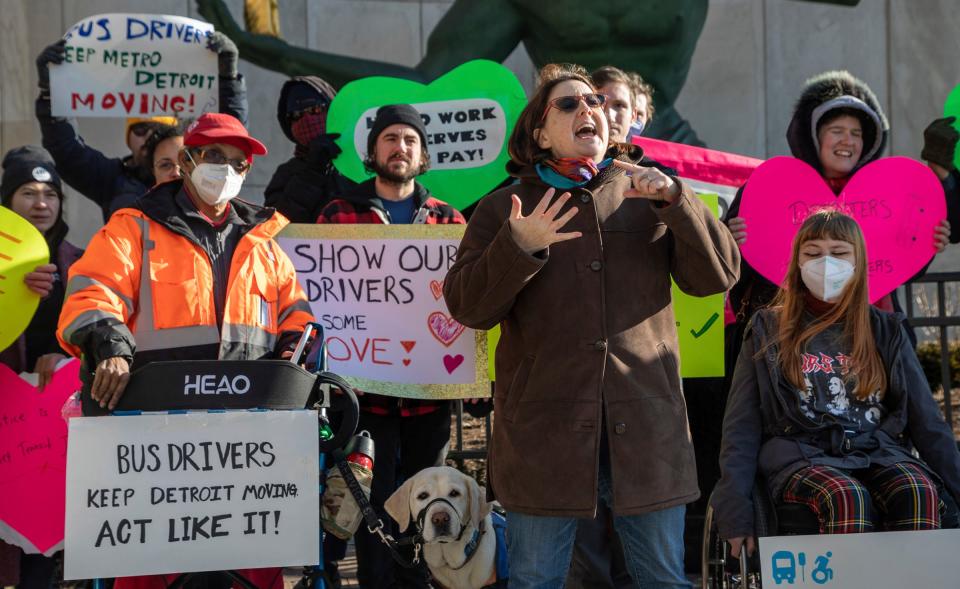
“While once a desirable and valued middle-class job, transit operations jobs have increasingly failed to keep pace with how work has evolved. Issues in compensation, safety, workplace culture, facilities, and flexibility make the job less appealing to new entrants and therefore are limiting the growth of the workforce,” according to a July 2022 report from the national advocacy group TransitCenter, called “Bus Operators in Crisis.”
Burton and Collier said the issues affecting drivers go beyond pay, encompassing everything from assaults on the job and the stress of dealing with traffic to inadequate break facilities. And drivers on the road face some very specific challenges.
“Communities have to be sensitive that we have to use public restrooms. When you get to the end of the line, sometimes there’s nowhere for you to go,” Burton said. “Some places will turn you down.”
Burton pointed to an experience at a small grocery store in Detroit. Even though she’d been a customer there before, when she asked to use the restroom early in the pandemic, a time when bus drivers were under particular stress, she was told she had to buy something first.
When drivers are under strain, the impact is also felt by those who rely on the system, Burton said.
“I know that the riders are suffering a lot,” she said.
John Couture, 47, a student in communications at Macomb Community College who lives in Warren, relies on the bus daily. He cited a disability called DiGeorge Syndrome, which left him with a hole in his heart, among several challenges that highlight his need for the bus to be reliable, in order to get to school or the grocery store or any place else on his agenda.
Driving isn’t an option. When he tried in the past, the experience left him too panicky, Couture said.
Bus delays, however, can be excessive. Couture said he’s had to wait for up to two hours at times for a bus to arrive. He has seen postings on buses about the driver shortage warning that some routes might not run.
Taking an Uber, which people with means sometimes assume is a realistic replacement for public transportation, is something Couture said he only contemplates in emergencies because of the cost. The price of a general SMART bus fare is $2, and reduced fares, such as for those with disabilities, are 50 cents, considerably less than most ride-hailing options cost.
Bus driver job listings
DDOT: Click here to see DDOT's job posting for drivers.
SMART: Click here for SMART's job posting for drivers.
Contact Eric D. Lawrence: elawrence@freepress.com. Become a subscriber.
This article originally appeared on Detroit Free Press: Pay, scheduling causes big bus driver shortage for DDOT, SMART

